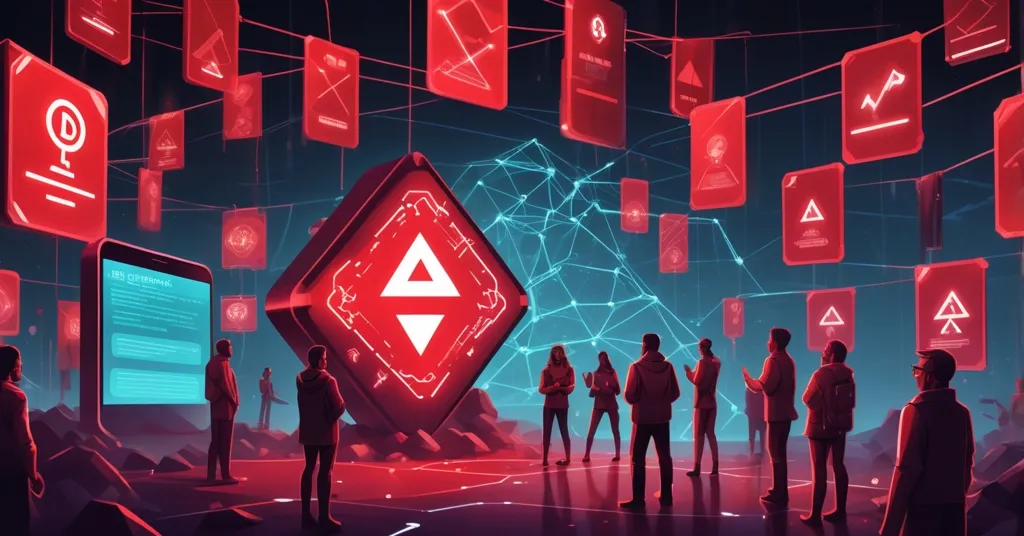Ruvi AI (RUVI) Presale: Next Big Thing or Risky Hype Bubble?

Ruvi AI (RUVI) Presale Review: Next Ripple or Risky Altcoin Hype?
Ruvi AI (RUVI) is storming the crypto scene with a presale that’s turning heads, a CoinMarketCap listing spiking its visibility, and bold claims of rivaling Ripple (XRP) in real-world impact. But beneath the hype of AI-powered creator tools and astronomical ROI projections, serious red flags loom large. Is this a revolutionary token or just another speculative bubble waiting to burst?
- Presale Frenzy: Over 215 million tokens sold, raising $2.7 million in Phase 2 at $0.015 per token.
- Visibility Boost: CoinMarketCap partnership fuels investor interest and community growth to over 2,600 holders.
- Major Concerns: Centralized token supply, unresolved audit issues, and speculative ROI promises scream caution.
Presale Hype: Numbers That Grab Attention
Let’s break down the buzz around Ruvi AI. Currently in Phase 2 of its presale, the project has sold over 215 million tokens and pulled in $2.7 million, with tokens priced at $0.015. That price is set to jump 33% to $0.020 once this phase—already 80% sold out—wraps up. The urgency in their marketing is palpable, pushing investors to dive in before the hike. Their community is swelling too, now boasting over 2,600 holders and counting. A recent listing on CoinMarketCap, a leading crypto data platform where prices, market caps, and project credibility are tracked by millions, has supercharged their visibility. For newcomers, a CMC listing is like a billboard on the crypto highway—it’s a signal of legitimacy and a magnet for attention, as seen in the Ruvi AI presale performance and CoinMarketCap impact.
Adding to the momentum, Ruvi AI has partnered with WEEX, a cryptocurrency exchange, to ensure global access and high liquidity for RUVI tokens. Liquidity, simply put, means how easily you can buy or sell a token without causing wild price swings. It’s a big deal for any project hoping to avoid being a dead market after launch. On the surface, these stats and moves paint Ruvi AI as a hot prospect in the crowded altcoin space. But numbers alone don’t tell the full story—let’s dig into what they’re actually selling.
Tech Promise: Targeting the Creator Economy with AI
Ruvi AI’s core pitch is ambitious: they’re targeting the $100 billion creator economy, the massive digital space where influencers, artists, and content makers build careers on platforms like YouTube, TikTok, and Instagram. This sector is booming—reports estimate influencer marketing alone hit $21 billion in 2023, with growth only accelerating as more people monetize online content. Ruvi AI aims to empower these creators with an AI-powered “super app” that promises to streamline their hustle. Imagine real-time trend insights to catch the next viral wave, automated workflows to slash tedious editing time, and a one-stop platform for image editing, video generation, and publishing. If it works, it could be a game-changer for anyone grinding to build an online audience, with potential to reshape the creator economy through blockchain.
The blockchain angle, though not fully detailed in their materials, presumably ties into transparency or tokenized rewards—perhaps creators earn RUVI for engagement or platform use. For those new to the tech, blockchain is a decentralized ledger that records transactions publicly, ensuring no single entity can fudge the numbers. If Ruvi AI can integrate this to build trust or incentivize creators, it could stand out. They’ve also undergone a CyberScope audit to verify their smart contracts—the self-executing code that powers decentralized apps on blockchains like Ethereum—claiming a focus on security and transparency. It’s a compelling vision, especially in a world where creators crave tools to stand out. But before we crown them the next big thing, let’s look at the cracks in this shiny facade.
The Ugly: Centralization, Security Risks, and Pure Speculation
Here’s where the skepticism kicks in—and trust me, it’s warranted. While Ruvi AI touts its CyberScope audit as proof of integrity, the report itself paints a messier picture. There’s a critical unresolved issue labeled “Stops Transactions,” meaning the smart contract could potentially freeze trades under certain conditions. That’s not just a glitch; it’s a dealbreaker for any token aiming to be trusted. Add to that nine minor issues and non-compliance with ERC-20 standards—the basic rules most Ethereum-based tokens follow for compatibility with wallets and exchanges—and you’ve got a project that’s far from bulletproof. For the uninitiated, non-compliance could mean your tokens don’t play nice with standard crypto tools, a headache waiting to happen. You can dive into the specifics of their smart contract audit details by CyberScope for more clarity on these issues.
Then there’s the decentralization disaster. Crypto was built on cutting out middlemen, spreading power to the many—think Bitcoin, where no single entity controls the network. Ruvi AI? A staggering 70% of its 5 billion token supply sits in one wallet, likely the team’s, with the top 10 wallets hoarding most of the rest. CyberScope scores their decentralization at a measly 37%, ranking them in the bottom 30% of audited projects. That’s not just centralized; it’s a dictatorship in crypto clothing. Worse, the smart contract isn’t renounced, meaning the team retains full control over the code and could tweak it at will. Compare that to Bitcoin’s ironclad, untouchable network, and Ruvi AI looks like a startup playing dress-up rather than a true blockchain contender. This level of control opens the door to price manipulation or, in the worst case, a rug pull—where the team dumps their massive holdings and vanishes with the profits, a concern echoed in discussions around centralization risks in Ruvi AI token distribution.
Let’s talk ROI hype while we’re at it. Their VIP presale tiers dangle returns from 9,233% on a $750 investment to a mind-boggling 13,200% on $7,500, based on a future token price of $1. Those numbers aren’t just optimistic; they’re pure fantasy, plucked from thin air with no guarantee. I’ve seen countless projects flash similar bait during presales, only to tank when the team unloads or the promised utility fizzles. And speaking of utility, there’s zero proof of a working app or user adoption—just slick marketing and whitepaper dreams. Established giants like Canva, with its subscription-based design tools, or Adobe Express, boasting AI-driven editing, already dominate creator software. How does Ruvi AI’s blockchain twist compete? Without a beta test or live demo, it’s all vaporware for now, sparking debates on platforms like Reddit about presale concerns and hype.
One more kicker: there’s no liquidity data available, per CyberScope, and market cap or trading volume stats are nonexistent. That means even if you buy into the hype, good luck selling when the buzz fades—you could be stuck holding a worthless bag. For a project screaming “invest now before the price jumps,” this lack of basic market info is a glaring warning sign. Crypto isn’t a charity; it’s a battlefield. And right now, Ruvi AI looks like it’s marching in with a paper sword.
Comparisons to Giants: Ripple, Ethereum, and Bitcoin’s Shadow
Analysts—conveniently unnamed in most reports—keep comparing Ruvi AI to Ripple (XRP), citing its potential for real-world utility. XRP carved a niche in cross-border payments, partnering with banks to speed up international transfers, despite ongoing legal battles with the SEC over its status as a security. Ruvi AI’s focus on creator tools is a different beast, but the parallel hinges on solving a tangible problem. Some even liken it to Ethereum (ETH), the backbone of smart contracts and decentralized apps, though Ruvi’s narrow niche feels like a pebble next to ETH’s mountain of adoption. These comparisons are flashy, but they’re also flimsy. XRP and ETH have years of infrastructure, partnerships, and battle scars. Ruvi AI is a presale infant with no track record—it’s like comparing a skateboard to a spaceship, a sentiment reflected in reports like analysts predicting Ruvi AI could rival Ripple.
From a Bitcoin maximalist lens, projects like Ruvi AI often look like distractions from the true mission of decentralized money. Bitcoin’s unassailable network, with no central control and a proven store-of-value narrative, makes Ruvi’s 70% team-held supply look like a bad joke. Why gamble on unproven altcoins when BTC remains the gold standard of freedom and disruption? Still, I’ll concede that altcoins can fill gaps Bitcoin shouldn’t—like niche tools for creators—if they deliver. Ruvi AI’s concept aligns with effective accelerationism, pushing tech forward fast, but execution is everything. Right now, it’s more hype than substance.
Broader Context: Creator Economy and Presale Pitfalls
Zooming out, the creator economy is a goldmine of opportunity. By 2027, it’s projected to surpass $500 billion as more individuals turn to digital platforms for income. Blockchain could play a role here—think transparent royalty payments or tokenized fan engagement—but it’s not a silver bullet. Projects blending AI and blockchain, like Render Token for decentralized computing, show promise, but many flop under the weight of overpromise. Ruvi AI isn’t the first to target creators, and it won’t be the last. Its success hinges on offering something non-blockchain tools can’t match, a bar that’s yet to be cleared, as explored in a comparison of Ruvi AI’s app features to other blockchain AI projects.
Presales, meanwhile, are a minefield. History is littered with flops like BitConnect, a 2017 Ponzi scheme that promised massive returns before collapsing, wiping out billions in investor funds. The playbook is familiar: hype insane ROIs, rush investors with “limited time” offers, then vanish or dump tokens post-launch. Ruvi AI’s urgent marketing and centralized supply echo these warning signs. Add the lack of KYC (Know Your Customer) verification—per CyberScope—and unresolved smart contract flaws, and you’ve got a recipe for regulatory scrutiny or worse. Crypto freedom doesn’t mean reckless gambling; it means informed rebellion against broken systems. For those questioning the legitimacy of this project, insights can be found in discussions on whether Ruvi AI is a legitimate crypto investment.
Final Verdict: Potential or Peril?
I’m all for innovation that disrupts the status quo, especially when it leverages blockchain to empower users in new ways. If Ruvi AI delivers a working app that transforms how creators operate, it could carve a meaningful niche outside Bitcoin’s store-of-value dominance or Ethereum’s dApp empire. Altcoins have their place in this financial revolution, filling gaps BTC shouldn’t touch. But as it stands, Ruvi AI is drowning in red flags—centralized control, shaky audits, speculative ROI nonsense, and no proven product. This isn’t about fear-mongering; it’s about cutting through the noise with cold, hard reality. For a deeper dive into the project’s background, check out the Ruvi AI cryptocurrency project wiki.
So, where do we land? Ruvi AI might be a dark horse if it fixes these structural flaws and ships a killer app. But right now, it’s a risky bet teetering on the edge of hype and hazard. For every Bitcoin purist championing decentralized money, and every altcoin fan cheering niche ideas, there’s a need for brutal skepticism. Do your own damn research—check token distribution, audit reports, and whether there’s a real product behind the promises. Crypto is about breaking free from centralized bullshit, not swapping one master for another. Let’s push for adoption, but with eyes wide open and wallets guarded.
Key Takeaways and Questions for Crypto Enthusiasts
- What is Ruvi AI, and what’s its core idea?
Ruvi AI (RUVI) is a presale cryptocurrency project aiming to revolutionize the $100 billion creator economy with an AI-powered super app for content creators, offering trend insights and automated tools, though no working product exists yet. - Why is Ruvi AI compared to Ripple (XRP) or Ethereum (ETH)?
Some analysts highlight its potential for real-world utility, similar to XRP’s payment solutions or ETH’s smart contract ecosystem, but these comparisons feel forced given Ruvi AI’s unproven status and narrow focus. - How secure and decentralized is Ruvi AI?
Despite a CyberScope audit, critical issues like potential transaction halts remain unresolved, and a 37% decentralization score—with 70% of tokens in one wallet—raises massive concerns about team control and trust. - Are the ROI projections for Ruvi AI’s presale realistic?
Promised returns of up to 13,200% are speculative, based on an unverified future price of $1 per token, and paired with no liquidity data, this looks more like a dangerous gamble than a sound investment. - Can Ruvi AI truly disrupt the creator economy with blockchain?
The concept holds promise if the app delivers unique value over competitors like Canva, but without a live product or clear blockchain benefits, it’s too early to call it a disruptor in this booming sector.



